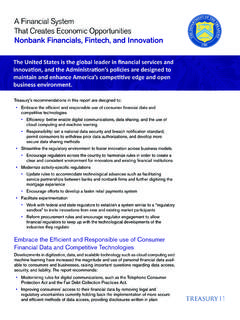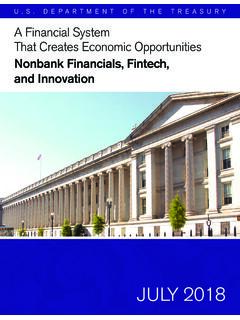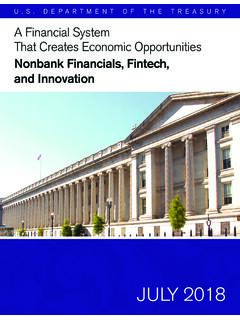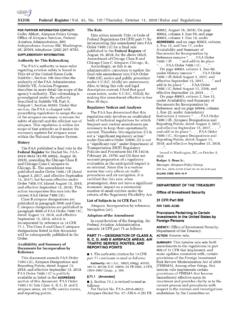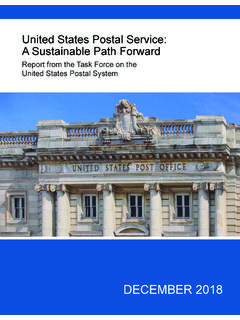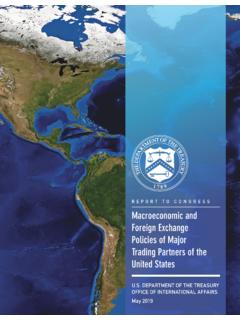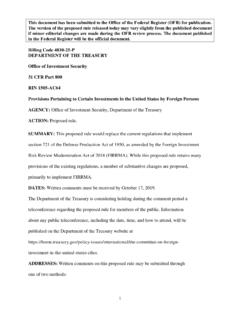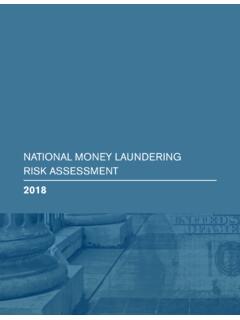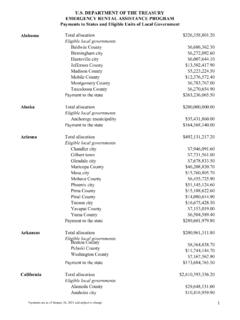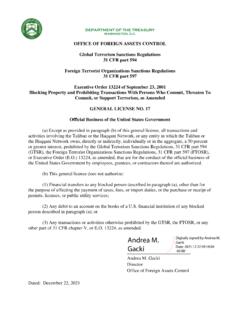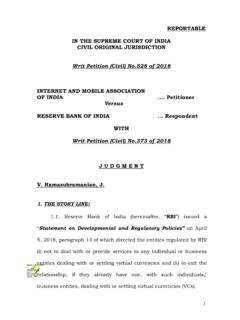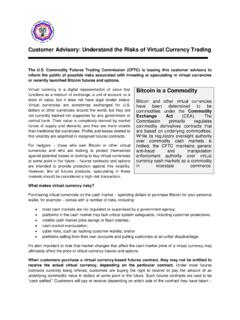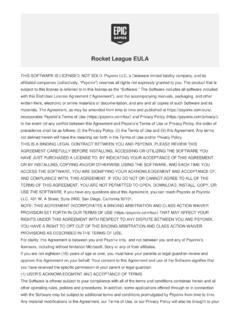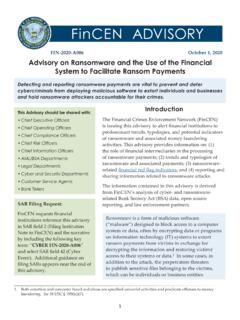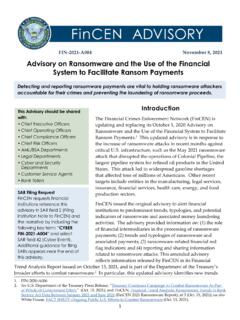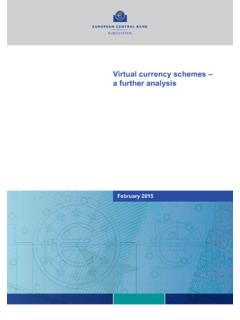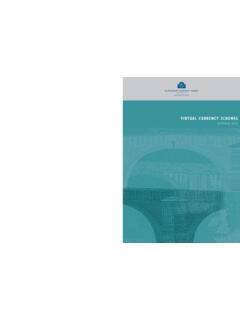Transcription of DEPARTMENT OF THE TREASURY WASHINGTON, D.C.
1 DEPARTMENT OF THE TREASURY WASHINGTON, Updated Advisory on Potential Sanctions Risks for Facilitating Ransomware Payments1 Date: September 21, 2021 The DEPARTMENT of the TREASURY s Office of Foreign Assets Control (OFAC) is issuing this updated advisory to highlight the sanctions risks associated with ransomware payments in connection with malicious cyber-enabled activities and the proactive steps companies can take to mitigate such risks, including actions that OFAC would consider to be mitigating factors in any related enforcement Demand for ransomware payments has increased during the COVID-19 pandemic as cyber actors target online systems that persons rely on to continue conducting business.
2 Companies that facilitate ransomware payments to cyber actors on behalf of victims, including financial institutions, cyber insurance firms, and companies involved in digital forensics and incident response, not only encourage future ransomware payment demands but also may risk violating OFAC regulations. The government strongly discourages all private companies and citizens from paying ransom or extortion demands and recommends focusing on strengthening defensive and resilience measures to prevent and protect against ransomware attacks. This advisory describes the potential sanctions risks associated with making and facilitating ransomware payments and provides information for contacting relevant government agencies, including OFAC if there is any reason to suspect the cyber actor demanding ransomware payment may be sanctioned or otherwise have a sanctions Background on Ransomware Attacks Ransomware is a form of malicious software ( malware )
3 Designed to block access to a computer system or data, often by encrypting data or programs on information technology systems to extort ransom payments from victims in exchange for decrypting the information and restoring victims access to their systems or data. In some cases, in addition to the attack, cyber actors threaten to publicly disclose victims sensitive files. The cyber actors then demand a 1 This advisory is explanatory only and does not have the force of law. It does not modify statutory authorities, Executive Orders, or regulations. It is not intended to be, nor should it be interpreted as, comprehensive, or as imposing requirements under law, or otherwise addressing any requirements under applicable law.
4 Please see the legally binding provisions cited for relevant legal authorities. 2 This advisory updates and supersedes OFAC s Advisory on Potential Sanctions Risks for Facilitating Ransomware Payments of October 1, 2020. 3 This advisory is limited to sanctions risks related to ransomware and is not intended to address issues related to information security practitioners cyber threat intelligence-gathering efforts more broadly. For guidance related to those activities, see guidance from the DEPARTMENT of Justice, Legal Considerations when Gathering Online Cyber Threat Intelligence and Purchasing Data from Illicit Sources (February 2020), available at -2- ransomware payment, usually through virtual currency , in exchange for a key to decrypt the files and restore victims access to systems or data.
5 In recent years, ransomware attacks have become more focused, sophisticated, costly, and numerous. According to the Federal Bureau of Investigation (FBI), there was a nearly 21 percent increase in reported ransomware cases and a 225 percent increase in associated losses from 2019 to Ransomware attacks are carried out against private and governmental entities of all sizes and in all sectors, including organizations operating critical infrastructure, such as hospitals. Often attacks also take place against vulnerable entities such as school districts and smaller businesses, in part due to the attacker s assumption that such victims may have fewer resources to invest in cyber protection and will make quick payment to restore services.
6 OFAC Designations of Malicious Cyber Actors OFAC has designated numerous malicious cyber actors under its cyber-related sanctions program and other sanctions programs, including perpetrators of ransomware attacks and those who facilitate ransomware transactions. For example, starting in 2013, a ransomware variant known as Cryptolocker was used to infect more than 234,000 computers, approximately half of which were in the United OFAC designated the developer of Cryptolocker, Evgeniy Mikhailovich Bogachev, in December Starting in late 2015 and lasting approximately 34 months, SamSam ransomware was used to target mostly government institutions and companies, including the City of Atlanta, the Colorado DEPARTMENT of Transportation, and a large healthcare company.
7 In November 2018, OFAC designated two Iranians for providing material support to a malicious cyber activity and identified two virtual currency addresses used to funnel SamSam ransomware In May 2017, a ransomware known as WannaCry infected approximately 300,000 computers in at least 150 countries. This attack was linked to the Lazarus Group, a cybercriminal organization sponsored by North Korea. OFAC designated the Lazarus Group and two sub-groups, Bluenoroff and Andariel, in September 4 Compare Federal Bureau of Investigation, Internet Crime Complaint Center, 2019 Internet Crime Report, available at , with Federal Bureau of Investigation, Internet Crime Complaint Center, 2020 Internet Crime Report, available at 5 Press Release, Dept.
8 Of Justice, Leads Multi-National Action Against Gameover Zeus Botnet and Cryptolocker Ransomware, Charges Botnet Administrator (June 2, 2014), available at 6 Press Release, Dept. of the TREASURY , TREASURY Sanctions Two Individuals for Malicious Cyber-Enabled Activities (Dec. 29, 2016), available at 7 Press Release, Dept. of the TREASURY , TREASURY Designates Iran-Based Financial Facilitators of Malicious Cyber Activity and for the First Time Identifies Associated Digital currency Addresses (Nov. 28, 2018), available at 8 Press Release, Dept. of the TREASURY , TREASURY Sanctions North Korean State-Sponsored Malicious Cyber Groups (Sept.)
9 13, 2019), available at -3- Beginning in 2015, Evil Corp, a Russia-based cybercriminal organization, used the Dridex malware to infect computers and harvest login credentials from hundreds of banks and financial institutions in over 40 countries, causing more than $100 million in theft. In December 2019, OFAC designated Evil Corp and its leader, Maksim Yakubets, for their development and distribution of the Dridex In September 2021, OFAC designated SUEX OTC, ( SUEX ), a virtual currency exchange, for its part in facilitating financial transactions for ransomware actors, involving illicit proceeds from at least eight ransomware variants.
10 Analysis of known SUEX transactions showed that over 40% of SUEX s known transaction history was associated with illicit OFAC has imposed, and will continue to impose, sanctions on these actors and others who materially assist, sponsor, or provide financial, material, or technological support for these Ransomware Payments with a Sanctions Nexus Threaten National Security Interests Facilitating a ransomware payment that is demanded as a result of malicious cyber activities may enable criminals and adversaries with a sanctions nexus to profit and advance their illicit aims. For example, ransomware payments made to sanctioned persons or to comprehensively sanctioned jurisdictions could be used to fund activities adverse to the national security and foreign policy objectives of the United States.
